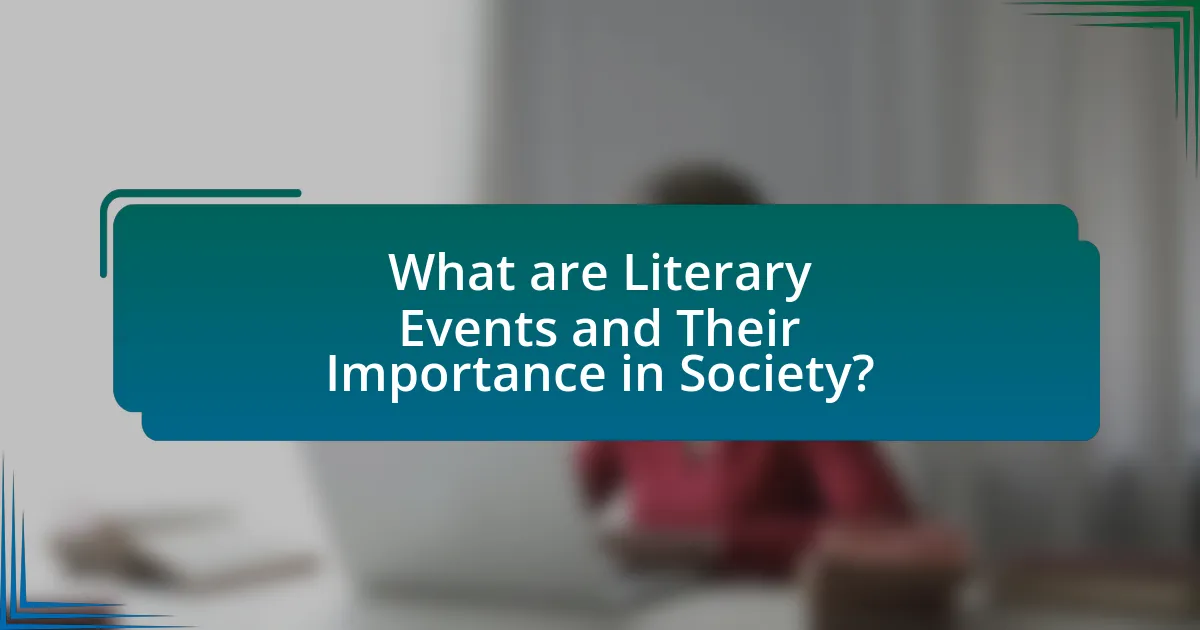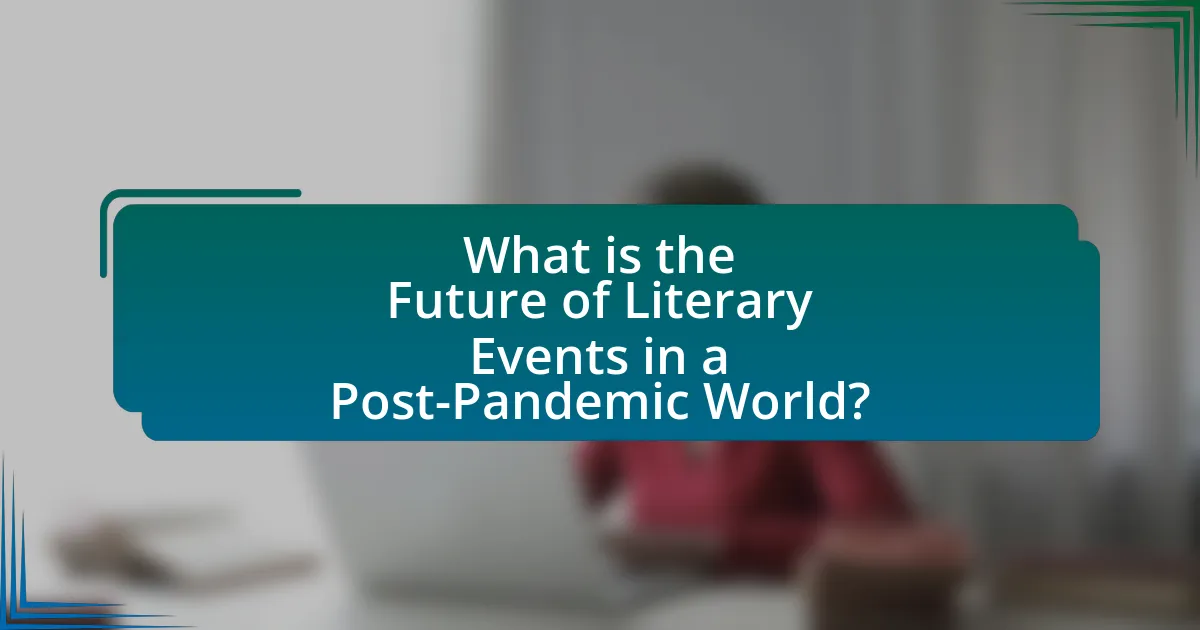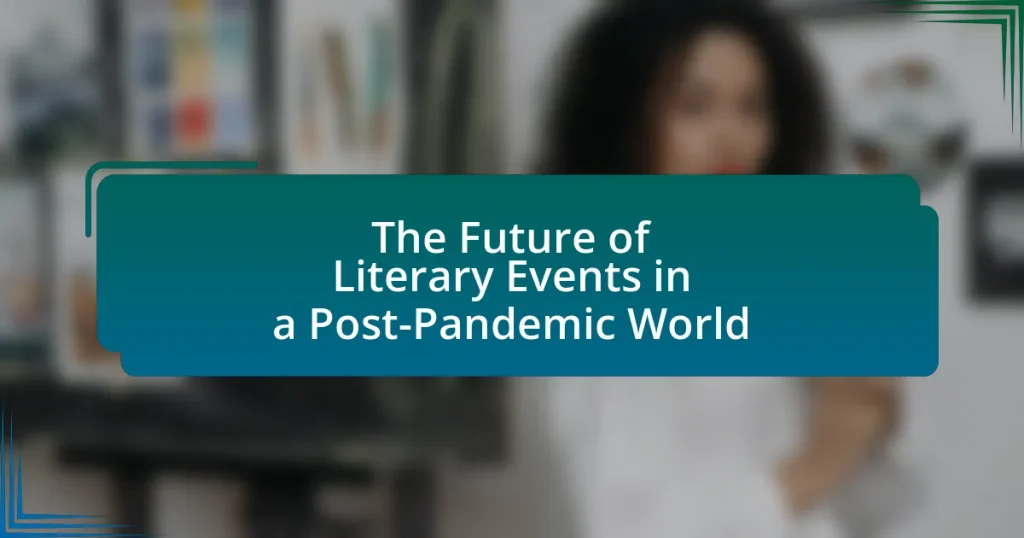Literary events are gatherings that celebrate literature through various activities such as readings, discussions, and workshops, playing a vital role in promoting community, literacy, and cultural exchange. The article explores the evolution of these events, particularly in response to the COVID-19 pandemic, which accelerated the shift to virtual formats and highlighted the importance of hybrid models that combine in-person and online participation. It discusses the historical influences on literary events, their impact on authors and local economies, and the innovations that emerged during the pandemic. Additionally, the article examines future trends, audience preferences, and best practices for organizing inclusive and sustainable literary gatherings in a post-pandemic world.

What are Literary Events and Their Importance in Society?
Literary events are gatherings that celebrate literature through readings, discussions, workshops, and book signings, serving as platforms for authors, readers, and publishers to engage. These events are important in society as they foster community, promote literacy, and encourage cultural exchange. For instance, events like the National Book Festival in the United States attract thousands of attendees, highlighting the public’s interest in literature and the role of such gatherings in enhancing social cohesion and intellectual discourse. Additionally, literary events can stimulate local economies by attracting tourism and supporting local businesses, as seen in the success of the Edinburgh International Book Festival, which generates significant economic impact for the region.
How have literary events evolved over time?
Literary events have evolved from traditional gatherings focused on readings and discussions to more diverse formats that incorporate technology and multimedia. Historically, literary events were primarily in-person, such as book signings and author readings, often held in bookstores or libraries. With the advent of the internet and social media, these events have expanded to include virtual platforms, allowing for global participation and accessibility. For instance, during the COVID-19 pandemic, many literary festivals transitioned to online formats, reaching wider audiences and enabling authors to connect with readers without geographical constraints. This shift has led to hybrid models that combine in-person and virtual elements, reflecting changing audience preferences and technological advancements.
What historical factors have influenced the development of literary events?
Historical factors that have influenced the development of literary events include the rise of print culture, the establishment of literary movements, and significant socio-political changes. The invention of the printing press in the 15th century facilitated the mass production of books, leading to increased literacy and the emergence of public readings and literary festivals. Additionally, movements such as Romanticism and Modernism shaped the themes and formats of literary gatherings, reflecting the cultural zeitgeist of their times. Furthermore, events like the French Revolution and the Industrial Revolution created new social dynamics that influenced the accessibility and nature of literary events, as they often served as platforms for political discourse and community engagement.
How do literary events contribute to cultural exchange?
Literary events contribute to cultural exchange by providing platforms for diverse voices to share their narratives and perspectives. These gatherings facilitate dialogue among authors, readers, and cultural representatives from various backgrounds, fostering mutual understanding and appreciation. For instance, international book fairs and literary festivals often feature authors from different countries, allowing attendees to engage with literature that reflects a wide array of cultural experiences. This interaction not only promotes cross-cultural dialogue but also encourages the translation and dissemination of literary works, further enriching the global literary landscape.
What role do literary events play in promoting authors and their works?
Literary events play a crucial role in promoting authors and their works by providing a platform for direct engagement with readers and industry professionals. These events, such as book fairs, readings, and festivals, facilitate networking opportunities that can lead to increased visibility and sales for authors. For instance, the American Library Association’s annual conference attracts thousands of attendees, allowing authors to showcase their books to librarians and booksellers, which can significantly boost their reach and readership. Additionally, literary events often feature panel discussions and workshops that highlight authors’ expertise, further enhancing their credibility and appeal in the literary market.
How do literary festivals enhance an author’s visibility?
Literary festivals enhance an author’s visibility by providing a platform for direct engagement with audiences and industry professionals. These events allow authors to participate in readings, panel discussions, and workshops, which can significantly increase their exposure. For instance, a study by the University of Edinburgh found that authors who participated in literary festivals reported a 30% increase in book sales and a notable rise in social media followers post-event. Additionally, literary festivals often attract media coverage, further amplifying an author’s reach and recognition within the literary community.
What networking opportunities do literary events provide for writers?
Literary events provide writers with essential networking opportunities that facilitate connections with industry professionals, peers, and potential collaborators. These events often feature panels, workshops, and readings where writers can engage directly with agents, publishers, and fellow authors, fostering relationships that can lead to mentorship, publishing deals, or collaborative projects. For instance, a study by the Association of Writers & Writing Programs (AWP) indicates that 70% of writers who attend literary festivals report making valuable connections that enhance their careers. Such interactions not only expand a writer’s professional network but also provide insights into industry trends and best practices, further supporting their development in the literary field.

How has the COVID-19 Pandemic Impacted Literary Events?
The COVID-19 pandemic has significantly transformed literary events by accelerating the shift to virtual formats. In-person gatherings were largely canceled or postponed, leading to a rise in online book launches, virtual author readings, and digital literary festivals. For instance, the 2020 London Book Fair was canceled, prompting many publishers to explore online alternatives, which allowed for broader global participation. This transition has not only expanded accessibility for audiences but also introduced new challenges, such as the need for digital literacy among participants and the potential loss of the communal experience that physical events provide.
What changes occurred in the format of literary events during the pandemic?
During the pandemic, literary events transitioned from in-person gatherings to virtual formats. This shift allowed authors and audiences to connect through online platforms, enabling events to reach a global audience without geographical limitations. For instance, many literary festivals and book launches were conducted via Zoom or social media, which increased participation rates significantly; for example, the 2020 Edinburgh International Book Festival reported a 300% increase in attendance compared to previous years due to its online format. Additionally, the pandemic prompted the use of pre-recorded sessions and live-streamed discussions, enhancing accessibility for those unable to attend physically.
How did virtual events change audience engagement?
Virtual events significantly transformed audience engagement by increasing accessibility and interactivity. Unlike traditional in-person events, virtual platforms allow participants from diverse geographical locations to join without travel barriers, leading to a broader audience reach. For instance, a study by Eventbrite in 2021 indicated that 70% of event organizers reported higher attendance rates for virtual events compared to their physical counterparts. Additionally, features such as live chats, polls, and Q&A sessions foster real-time interaction, enhancing participant involvement. This shift has resulted in a more dynamic and inclusive engagement model, as evidenced by the rise in online literary festivals that attracted global audiences, demonstrating the effectiveness of virtual formats in connecting with diverse literary communities.
What challenges did organizers face in transitioning to online formats?
Organizers faced several challenges in transitioning to online formats, primarily including technological limitations, audience engagement, and logistical issues. Technological limitations arose from the need for reliable internet access and suitable platforms, which not all participants had. Audience engagement proved difficult as virtual formats often led to reduced interaction and participation compared to in-person events. Logistical issues included coordinating schedules across different time zones and managing the technical aspects of streaming and recording events. These challenges highlighted the complexities of adapting traditional literary events to a digital environment.
What lessons have been learned from hosting literary events during the pandemic?
Hosting literary events during the pandemic has revealed the importance of adaptability and the effectiveness of digital platforms. Organizers learned that virtual events can reach a broader audience, as evidenced by a 2021 survey indicating that 70% of participants in online literary events were from outside the host’s geographical area. Additionally, the necessity for health and safety protocols highlighted the value of hybrid models, combining in-person and virtual elements, which can enhance accessibility and engagement. These insights suggest that future literary events should incorporate flexible formats to accommodate diverse audiences and preferences.
How can organizers improve future events based on pandemic experiences?
Organizers can improve future events by implementing hybrid formats that combine in-person and virtual participation. This approach allows for greater accessibility, as seen during the pandemic when many events transitioned online, resulting in increased attendance and engagement from diverse audiences. For instance, the 2021 Virtual Book Expo reported a 40% increase in global participation compared to previous years, demonstrating the effectiveness of hybrid models. Additionally, organizers should prioritize health and safety protocols, such as enhanced sanitation measures and flexible cancellation policies, to build attendee confidence. These strategies, informed by pandemic experiences, can lead to more resilient and inclusive literary events in the future.
What innovations emerged from the necessity of virtual events?
Innovations that emerged from the necessity of virtual events include advanced streaming technologies, interactive platforms, and enhanced audience engagement tools. These innovations allowed organizers to host events that were accessible to a global audience, breaking geographical barriers. For instance, platforms like Zoom and Hopin introduced features such as breakout rooms and live polls, which facilitated real-time interaction among participants. Additionally, the integration of social media for live discussions and networking opportunities became prevalent, enhancing community building. According to a report by Eventbrite, 70% of event organizers noted increased audience reach through virtual formats, demonstrating the effectiveness of these innovations in expanding participation and engagement.

What is the Future of Literary Events in a Post-Pandemic World?
The future of literary events in a post-pandemic world is likely to feature a hybrid model that combines in-person and virtual experiences. This shift is driven by the increased accessibility and reach that online platforms provided during the pandemic, allowing authors and audiences to connect globally. According to a survey by the Book Industry Study Group, 70% of publishers reported that virtual events expanded their audience base, indicating a lasting preference for hybrid formats. As a result, literary festivals and readings will likely continue to incorporate digital elements, enhancing participation while maintaining the intimacy of live interactions.
How will hybrid events shape the future of literary gatherings?
Hybrid events will significantly shape the future of literary gatherings by expanding accessibility and audience reach. These events combine in-person and virtual participation, allowing authors and attendees from diverse geographical locations to engage without the constraints of travel. For instance, a 2021 survey by Eventbrite indicated that 67% of event organizers planned to continue offering hybrid formats post-pandemic, highlighting a shift in how literary events are structured. This model not only accommodates varying comfort levels regarding in-person gatherings but also enhances engagement through interactive online features, such as live Q&A sessions and virtual book signings, thereby fostering a more inclusive literary community.
What are the benefits of combining in-person and virtual formats?
Combining in-person and virtual formats enhances accessibility and engagement for literary events. This hybrid approach allows participants from diverse geographical locations to attend, increasing overall attendance and participation rates. For instance, a study by the Event Marketing Institute found that hybrid events can boost attendance by up to 30% compared to traditional formats. Additionally, the combination fosters greater interaction through various platforms, enabling real-time feedback and discussions that enrich the experience for both in-person and virtual attendees.
How can technology enhance the experience of literary events?
Technology can enhance the experience of literary events by facilitating virtual participation and interactive engagement. For instance, live-streaming platforms allow authors and audiences to connect globally, breaking geographical barriers and increasing attendance. According to a report by Eventbrite, 70% of event organizers believe that technology improves attendee engagement, demonstrating its effectiveness in creating immersive experiences. Additionally, tools like social media enable real-time discussions and feedback, enriching the dialogue around literary works. This integration of technology not only broadens access but also fosters a dynamic community of readers and writers, ultimately transforming the landscape of literary events.
What trends are likely to influence the organization of literary events moving forward?
Hybrid events combining in-person and virtual formats are likely to influence the organization of literary events moving forward. This trend emerged during the COVID-19 pandemic, where many literary festivals and author readings transitioned online, allowing for broader audience reach and participation. According to a report by Eventbrite, 70% of event organizers plan to continue offering virtual components even as in-person gatherings resume, highlighting the sustained demand for accessibility and flexibility in event formats. Additionally, the integration of technology, such as live streaming and interactive platforms, will enhance audience engagement and provide opportunities for global participation, further shaping the future landscape of literary events.
How will audience preferences shape the future of literary events?
Audience preferences will significantly shape the future of literary events by driving the demand for hybrid formats that combine in-person and virtual experiences. As seen during the pandemic, many readers appreciated the accessibility of online events, which allowed participation regardless of geographical constraints. According to a survey by the Pew Research Center, 61% of respondents expressed interest in attending virtual events even after in-person gatherings resume, indicating a lasting shift in expectations. This trend suggests that organizers will need to adapt by offering diverse formats that cater to varying audience preferences, ensuring broader engagement and inclusivity in literary events.
What role will sustainability play in the planning of future events?
Sustainability will play a crucial role in the planning of future events by prioritizing eco-friendly practices and reducing environmental impact. Event planners will increasingly adopt sustainable measures such as minimizing waste, utilizing renewable resources, and promoting carbon offset initiatives. For instance, a report by the Global Sustainable Tourism Council indicates that 70% of event attendees prefer sustainable practices, highlighting the demand for greener options. Additionally, implementing digital solutions can reduce paper usage and travel emissions, aligning with sustainability goals. Thus, the integration of sustainability into event planning not only meets attendee expectations but also contributes to broader environmental objectives.
What best practices should organizers adopt for future literary events?
Organizers should adopt a hybrid model for future literary events, combining in-person and virtual formats to maximize accessibility and participation. This approach allows attendees who cannot travel to still engage with the event, as evidenced by the increased attendance rates seen during virtual events in 2020, where platforms like Zoom facilitated participation from a global audience. Additionally, organizers should prioritize health and safety protocols, such as social distancing and sanitation measures, to ensure the well-being of all participants. Implementing these practices not only enhances the experience but also builds trust among attendees, which is crucial for the success of future events.
How can organizers effectively engage diverse audiences?
Organizers can effectively engage diverse audiences by implementing inclusive programming that reflects various cultural perspectives and interests. This approach ensures that events resonate with a broader demographic, fostering a sense of belonging among attendees. For instance, incorporating multilingual materials and diverse speakers can enhance accessibility and representation, as evidenced by studies showing that events with varied cultural content attract wider participation. Additionally, utilizing social media platforms to reach different communities can further enhance engagement, as data indicates that targeted outreach increases attendance and interaction rates among diverse groups.
What strategies can enhance the overall experience for attendees?
To enhance the overall experience for attendees at literary events, organizers should implement interactive sessions, such as workshops and Q&A panels, which actively engage participants. Research indicates that events incorporating audience participation lead to higher satisfaction rates; for instance, a study by Eventbrite found that 70% of attendees prefer events that offer interactive elements. Additionally, providing a hybrid format that combines in-person and virtual attendance options can increase accessibility and broaden audience reach, as evidenced by the surge in online participation during the pandemic. Furthermore, personalized communication before and after the event fosters a sense of community and belonging, which is crucial for attendee retention and satisfaction.


